
INDEX | HEALING WISE | Q & A with SUSUN | GREEN BLESSINGS
THE LIBRARY | PEOPLE MAKING CHANGE | GODDESS ART GALLERY
The Library ...
The Fermentation processes of Vegetables
by Anne-Marie Fryer Wiboltt
Almost everyone feels a little intimidated when I ask if they want to make sauerkraut or any other fermented foods at home. They might imagine a huge mess in the kitchen, molds in different colors and time consuming processes. But this is not so at all. The fermentation process is fairly simple and requires very little preparation time with little mess to clean up. However, the length of time it takes for different foods to complete fermentation may vary and take its own good time. Short term pickles or cultured foods, such as kefir, take from a few hours to a day or two to complete the process. Long term fermented or cultured foods, like miso, tamari cheese, can take up to a year or more.
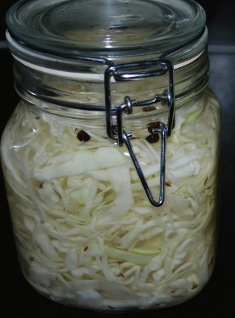 Many well known lacto fermented vegetables, such as sauerkraut are ready in about 10-14 days. But you don't do anything during that time other than checking the temperature now and then. After I cut the cabbage for the sauerkraut, mix it with sea salt and place it in a jar with a tight fitting lid, I cover the jar with a dark cloth. Then I am done! From then on the fermentation fairies do their magic. It really is magic! Many well known lacto fermented vegetables, such as sauerkraut are ready in about 10-14 days. But you don't do anything during that time other than checking the temperature now and then. After I cut the cabbage for the sauerkraut, mix it with sea salt and place it in a jar with a tight fitting lid, I cover the jar with a dark cloth. Then I am done! From then on the fermentation fairies do their magic. It really is magic!
Most living organisms need light and oxygen to live and grow, not so with lacto bacteria. They grow in the absence of light and air. Remarkable isn't it? Under the ideal conditions the lacto fermentation process undergoes two stages. The first is a breaking down period, where the lactic bacteria break down the sugars in the vegetables and turn it into acetic acid, which keeps down the competing bacteria. The second stage is a build-up period, where, among other things, complex vitamins C and B (including B-12), enzymes, and the tastes are created. It is important to remember that the pickling time should not be shortened, as the fermentation process may not be finished, and that checking the pickles too early may let in unwanted air that may spoil your pickles.
Lacto fermented pickles include most middle and long term pickles. For example, sauerkraut, Kim Chi, and Takuwan, The long term Japanese fermented products of umeboshi, miso and tamari are also created under a similar process.
During the pickling time, the vegetables should be kept in a cool place (62-68 degrees F). However, sauerkraut and other salt based pickles, should be kept about room temperature (72 degrees F) for the first 2 – 3 days, while the lacto bacteria are getting established.
Very short time pickles, done in a few days, also undergo the breaking down process. This makes the vegetables more digestible, and also adds taste, especially when made with natural fermented vinegars, miso, tamari, and umeboshi products. In addition, these products will add their own fermented qualities, and nutrition to these types of pickles.
Sometimes a layer of white gray fungus will stay on top of the pickling brine when in open crocks. This may be removed without worry of the vegetables going bad, if the rest of the process is going as it should. All other colors indicate that the lacto fermentation has not taken place, and that foreign bacteria have developed. This means that you will have to start again. Foreign bacteria or oxidation rarely take over when cleanliness has been observed and fermenting in a jar with a tight lid.
Naturally, using top quality ingredients helps insure that your labors will yield delicious and healthful pickles. Please make sure to be very clean, wash your hands well, sterilize or wash really well with soapy hot water all your kitchen tools you use for the process such as crocks and glasses, to help maximize your success.
When finished with the pickling, the brine may be saved for other uses. Pickling brine, or paste, may be used to add flavor to soups, sauces, and dressings. Below is one of my favorite brine recipes. To learn more about how to make easy fermented and culture foods join my course Culturing from the Heart. I have made five videos to help you understand the process and see the techniques. For a preview log in to http://wisewomanuniversity.ning.com/ You will also find a wealth of other wonderful offerings and videos from various mentors.
Bon Appetit
APPLE CARROT PICKLES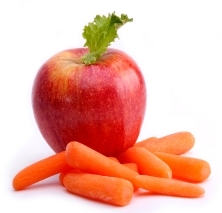
1-2 apples
2 medium carrots
1 ½ c spring or well water,
1/2 Tbsp sea salt or umeboshi paste
Bring the water to a boil and add the salt. Let it cool. Grate the carrots and the apples roughly and mix well. Place them in a wide mouth pint jar and pour the liquid over. Place an airtight lid on the jar and let it sit for 5-10 days or longer in a cool, dark place. This pickle is sweet and sour; delicious and refreshing.
 Anne-Marie Fryer Wiboltt is a Waldorf class and kindergarten teacher, biodynamic farmer, author and nutritional counselor. She has taught nutritional cooking and counseled for 25 years in her homeland Denmark, Europe and the United States. Anne-Marie Fryer Wiboltt is a Waldorf class and kindergarten teacher, biodynamic farmer, author and nutritional counselor. She has taught nutritional cooking and counseled for 25 years in her homeland Denmark, Europe and the United States.
She trained as a macrobiotic cooking teacher and counselor and studied the principles of oriental medicine and the research of Dr. Weston A. Price before embracing the anthroposophical approach to nutrition, food and cooking.
This Four week course will explore some of the many benefits of fermented and cultured foods,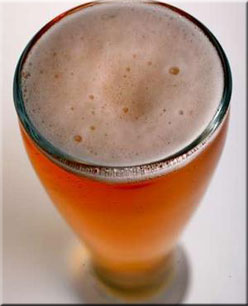 and why it is important to include them regularly with every meal. You will be guided through the steps of making sauerkraut, kimchi, pickled vegetables, kefir, soft cheese, and yogurt, as well as get a chance to discover new fermented drinks such as kvass, wines, and beers. I will aim at answering personal questions around your culturing and fermenting experiences. and why it is important to include them regularly with every meal. You will be guided through the steps of making sauerkraut, kimchi, pickled vegetables, kefir, soft cheese, and yogurt, as well as get a chance to discover new fermented drinks such as kvass, wines, and beers. I will aim at answering personal questions around your culturing and fermenting experiences.
Intuitively we know that cultured and fermented foods are real health foods. Naturally fermented and cultured foods are an exceptional way to prepare different ingredients and some of the most important side dishes and condiments in our diet. They are often overlooked or not mentioned when we describe what we had for dinner, and yet they are pivotal in creating a well-balanced, nutritious meal.
They add a bounty of nourishing, life-promoting substances and life forces, almost miraculous curative properties, and a wealth of colors, flavors, and shapes. They increase the appetite, stimulate the digestion, and make any simple meal festive and satisfying. The course will be highly practical with many hands-on activities.
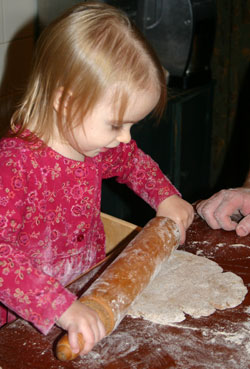 In this Four week course you will learn about the nutritional needs of your growing child and receive delicious, seasonal, wholesome nutritious menus and recipes on affordable budget so as to encourage children to eat and live healthy. In this Four week course you will learn about the nutritional needs of your growing child and receive delicious, seasonal, wholesome nutritious menus and recipes on affordable budget so as to encourage children to eat and live healthy.
During this course we will explore the nutritious needs for your growing child.
We will discover how rhythm, simplicity and nourishing activities support a healthy child development. You will find new ways to encourage your child to develop a taste for natural, wholesome foods as well as receive and create delicious, seasonal nutritious menus and recipes that stay within the limits of your budget.
Cooking for the Love of the World:
Awakening our Spirituality through Cooking
by Anne-Marie Fryer Wiboltt

A heart-centered, warmth-filled guide to the nurturing art of cooking. 200 pages, softbound

|
 The Wise Woman University (WWU) is a sacred distance learning environment for the reweaving of the healing cloak of the Ancients. The Wise Woman University (WWU) is a sacred distance learning environment for the reweaving of the healing cloak of the Ancients.
WWU is an online non-accredited distance learning environment, offering courses to women for personal empowerment and well-being. Register at the Wise Woman Bookshop to choose from WWU's empowering courses.
At the Wise Woman University you will find mentors with women-centered skills pleased to offer their wisdom to you in a format that is lively, interesting, and easily available.
Click to Learn more |
|
|
Wise Woman Herbal Ezine is sponsored by
www.susunweed.com and www.wisewomanbookshop.com
HEALING WISE | Q & A with SUSUN | GREEN BLESSINGS
THE LIBRARY | PEOPLE MAKING CHANGE | GODDESS ART GALLERY
©Susun
Weed -Wise Woman Center
~ Disclaimer & Privacy Policy ~
|

 The Wise Woman University (WWU) is a sacred distance learning environment for the reweaving of the healing cloak of the Ancients.
The Wise Woman University (WWU) is a sacred distance learning environment for the reweaving of the healing cloak of the Ancients.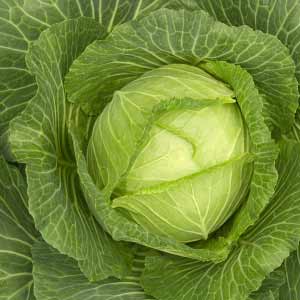
 Many well known lacto fermented vegetables, such as sauerkraut are ready in about 10-14 days. But you don't do anything during that time other than checking the temperature now and then. After I cut the cabbage for the sauerkraut, mix it with sea salt and place it in a jar with a tight fitting lid, I cover the jar with a dark cloth. Then I am done! From then on the fermentation fairies do their magic. It really is magic!
Many well known lacto fermented vegetables, such as sauerkraut are ready in about 10-14 days. But you don't do anything during that time other than checking the temperature now and then. After I cut the cabbage for the sauerkraut, mix it with sea salt and place it in a jar with a tight fitting lid, I cover the jar with a dark cloth. Then I am done! From then on the fermentation fairies do their magic. It really is magic!
 Anne-Marie Fryer Wiboltt is a Waldorf class and kindergarten teacher, biodynamic farmer, author and nutritional counselor. She has taught nutritional cooking and counseled for 25 years in her homeland Denmark, Europe and the United States.
Anne-Marie Fryer Wiboltt is a Waldorf class and kindergarten teacher, biodynamic farmer, author and nutritional counselor. She has taught nutritional cooking and counseled for 25 years in her homeland Denmark, Europe and the United States. and why it is important to include them regularly with every meal. You will be guided through the steps of making sauerkraut, kimchi, pickled vegetables, kefir, soft cheese, and yogurt, as well as get a chance to discover new fermented drinks such as kvass, wines, and beers. I will aim at answering personal questions around your culturing and fermenting experiences.
and why it is important to include them regularly with every meal. You will be guided through the steps of making sauerkraut, kimchi, pickled vegetables, kefir, soft cheese, and yogurt, as well as get a chance to discover new fermented drinks such as kvass, wines, and beers. I will aim at answering personal questions around your culturing and fermenting experiences. In this Four week course you will learn about the nutritional needs of your growing child and receive delicious, seasonal, wholesome nutritious menus and recipes on affordable budget so as to encourage children to eat and live healthy.
In this Four week course you will learn about the nutritional needs of your growing child and receive delicious, seasonal, wholesome nutritious menus and recipes on affordable budget so as to encourage children to eat and live healthy.

